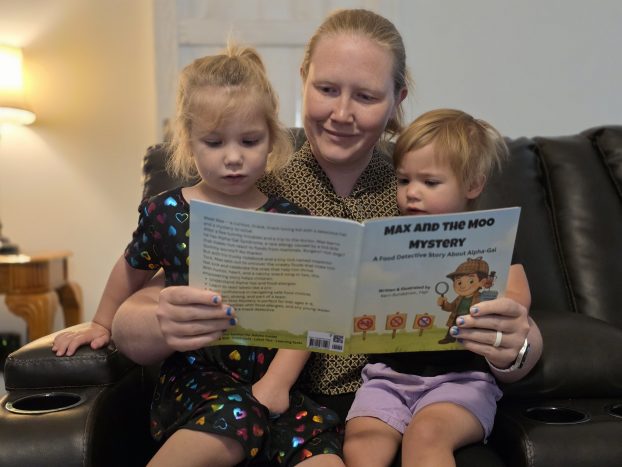Paying Tribute: Rev. J. Samuel Williams Jr. honored by Farmville
Published 6:18 pm Friday, December 15, 2023

- The Rev. J. Samuel Williams Jr., a minister who was among the students who walked out with Barbara Rose Johns in 1951, is seen here delivering the keynote during a mass meeting to commemorate milestones related to education and civil rights. (Photo by Emily Hollingsworth)
|
Getting your Trinity Audio player ready...
|
Father. Pastor. Teacher. Historian. Activist. The words and actions of Rev. J. Samuel Williams Jr. have inspired generations of men and women in Farmville, from those who listened to his sermons to those who asked questions about the town’s history and others who walked with and were arrested with him in the fight for civil rights. It seemed fitting then, that a man who walked with and fought to guide the community for decades received his own street.
On Friday, Dec. 15, the Town of Farmville did just that, honoring Rev. Williams by officially renaming Watkins Street to Williams Way. The road is right off of High Street and is the place where Rev. Williams still lives.
“It means a lot for us as a family to know that Farmville really appreciates him and sees the value in the work that he has done,” said Williams’ daughter Omega Wilson. “All of us are proud to be legs to his legacy. It’s an honor and a joy to see this day come.”
Trending
Now the actual decision happened several months ago. Back in June, the Farmville Town Council signed off on the decision, but the change was postponed six months. That way the Post Office could be notified of the change and know where to deliver mail. Residents on the street also had the time to change their address on everything from drivers’ licenses to Amazon accounts. The goal was to make the adjustment easy, so no packages got lost or other issues come up.
And as residents of Farmville gathered for the ceremony, they paid tribute to the man and his work.
The word I use to describe Rev. Williams is ever present,” said Moton Museum Director Cainan Townsend. “(He is) a pillar in this community. A remarkable human, a remarkable reverend, minister, an activist. You name it, no matter how bad things have been or are at present, he’d never hesitate to loudly sing the words ‘We shall overcome Someday,’ meaning every single word every time he sang it.”
Townsend pointed out that there are many reasons to rename a building or a road. Maybe values change or maybe you learn something terrible about the person that road or building is named after. But none of that is true in this case.
“In this case, we get to name something for a positive reason,” Townsend said. “We get to acknowledge the impacts and contributions that a person like Rev. J. Samuel Williams Jr. has had on this community and this country and this planet.”
The work of Rev. J. Samuel Williams Jr.
Multiple speakers on Friday referred to Rev. Williams as a history maker and if you look back over Farmville’s past, that’s completely true. Think back to July 28, 1963. Rev. J. Samuel Williams Jr. had, along with Rev. Goodwin Douglas, organized the latest in a series of student civil rights demonstrations in town, bringing almost 500 people together. The goal on that July morning was to integrate downtown churches.
Trending
Rev. Williams was standing with a group on the steps of Farmville Baptist Church, praying and singing hymns. One portion of the group made it inside of Johns Memorial Episcopal Church, where they sat with then-Longwood University Dean Dr. C.G. Gordon Moss. Another portion of the group tried to worship at Farmville United Methodist Church and was rejected. After trying and being rejected again at Farmville Baptist Church, the group started to pray and sing hymns on the church steps. They were arrested and charged with “disturbing the public worship of God”, the first time that had happened after a “kneel-in” in the South.
“I felt hurt we were being arrested, to prevent us from worshiping God,” Williams said in a 2017 discussion with East Rockingham High School students. “Singing, praying, listening to the message, just like the people inside were doing. I saw that as a great contradiction there. We didn’t know what to expect but it was something we had to do. You never know how it’s going to end up, but you have to be brave enough to do it.”
And time and again, you see Rev. Williams’ own actions echoing those words. More than a decade before the protest at Farmville Baptist, Williams was part of another portion of Farmville history. He took part in the April 23, 1951 student strike at Robert Russa Moton High, alongside Barbara Rose Johns.
Moton High was the first free-standing segregated high school for African-American students in Prince Edward County. Originally built in 1939, its max capacity was to hold exactly 180 students, but had over 477. As such, there was overcrowding in the classrooms, along with subpar conditions and hand-me-down education materials.
In a 2016 interview with The Herald, Williams described his time at Moton High School as being challenging and dark.
“We were trying to find our way out of academic darkness,” Williams said, adding the students wanted to “(find) a way out of stereotypes.”
The strike at Moton garnered the attention and support of NAACP lawyers Oliver Hill and Spottswood Robinson, and a suit sparked by the protest was filed under the name Davis v. Prince Edward. In 1954, that case became one of the five cases that the U.S. Supreme Court reviewed during the landmark Brown v Board of Education case, which ultimately declared segregation unconstitutional.
Legs to his legacy
Through the years, Rev. Williams has served in a number of other roles in Farmville.
“We know that he was the historian of our community,” said James Ghee, President of the Prince Edward County NAACP. “We know that his preaching has been outstanding throughout his career. The impact he’s had on our community is unbelievable.”
That impact also came as the pastor of three churches, including Levi Baptist, First Baptist and Beulah Baptist. And now, at age 90, he’s been back at Levi Baptist as the church’s senior pastor. Rev. Williams himself wasn’t able to attend Friday’s event, as he suffered a stroke last week and is currently in rehab. But as the Farmville community gathered to celebrate his life and offer prayers for healing, they continued to reflect both on his past work and the efforts still continuing.
A Biblical passage also kept popping up through Friday’s ceremony, focusing on Rev. Williams’ work. That was Psalm 37:23-24, which states “ The Lord directs the steps of the godly. He delights in every detail of their lives. Though they stumble, they will never fall, for the Lord holds them by the hand.”
As members of the community talked about the encouragement, the support and strength Rev. Williams provided, they pointed to the Psalms, mentioning how God directed all of his steps. And now that same direction falls on the rest of the community.
Cainan Townsend challenged those in attendance to think of Rev. J. Samuel Williams Jr. as they drive by the road that bears his name.
“And when you think about him, think about what he would be doing,” Townsend said. “And what he would be doing is standing up for people who need it, pointing out injustice when he sees it and acting on it. And that’s what he would want you to do.”





